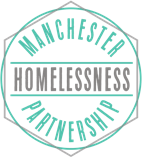Learn about homelessness in Manchester
Manchester has some of the highest levels of homelessness in the UK – according to statistics published by Shelter in January 2023, Manchester ranks third-highest in the country for people experiencing homelessness per capita, with around 7,407 people (one in 74 people) experiencing homelessness.
Often people think about people who are street homelessness or rough sleeping, but this represents the smallest segment of the homeless population (2-5% in Manchester before Covid). Other circumstances include people who are in emergency shelters, temporary accommodation, sofa-surfing, and unsafe/ substandard housing.
What are the causes and consequences of homelessness?
Causes
People become homeless for lots of different reasons. There are social causes of homelessness, such as a lack of affordable housing, poverty and unemployment. For many, life events like a relationship breaking down, losing a job, mental or physical health problems, or substance misuse push people into homelessness.
People are forced into homelessness when they leave prison, care or the army with no home to go to. Many women experiencing homelessness have escaped a violent or abusive relationship.
Top three causes of homeless in Manchester (pre-Covid):
- Section 21 eviction
- Friend/family eviction
- Domestic Abuse
Consequences
Evidence suggests that the longer someone is homeless, the more complex their problems become and the more difficult it can be to get back on their feet.
Not having a home as a stable and secure base can make it harder for people to find a job, stay healthy and maintain relationships.
People with no home often have complex health needs. The mean age at death of homeless people was 46 years for men, 43 years for women. This compares to 76 years for men and 81 years for women in the general population. Access to healthcare is only possible when someone is registered with a GP. People often experience feelings of isolation, increasing their chances of taking drugs or experiencing mental health problems. Sometimes, issues that people believe cause homelessness are actually a result of homelessness, such as substance abuse and poor mental health.
Manchester’s Homelessness and Rough Sleeping Strategy and the Joint Strategic Needs Assessment
Manchester Homelessness and Rough Sleeping Strategy (2024-2027) sets out how the council and its partners will work together towards ending homelessness.
Health and Homelessness Joint Strategic Needs Assessment (JSNA) provides a summary of data and evidence regarding the health of people who are rough sleeping or experiencing homelessness in Manchester.
Learning from the Manchester Homelessness Partnership
Homeless Link’s Manchester Homelessness Partnership Toolkit (2018)
Reports on homelessness in Manchester
#HealthNow Peer Research Report: Understanding homeless health inequality in Greater Manchester
What’s happening in Greater Manchester?
The Greater Manchester Homelessness Action Network (GMHAN) is a network for everyone working to end homelessness in all 10 boroughs of Greater Manchester. Like the MHP, the GMHAN is cross sector, and operates on the basis of ‘community development’ and co-production, bringing people together to work side by side rather than alone or in hierarchies.
Read the Greater Manchester Homelessness Prevention Strategy here.
Read the Cross Borough Homelessness Placements - Pan Greater Manchester Out of Borough Placement Protocol September 2024 here.
